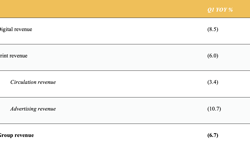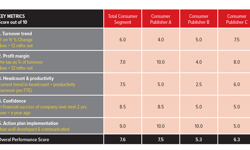The Organisation Census is now in its fourth year and has evolved over time to give a deeper view of the key drivers within the digital business of many of the UK’s leading publishing companies. It acts as a benchmark for the digital publishing industry in terms of where publishers are currently at and also captures their intentions for development over the next 12 months. At its core, the Organisation Census covers a number of areas including products and strategy, structure and people issues, technology focus, investment and future challenges for the forthcoming 12 months. A total of 37 organisations, representing well over 1500 respected publisher brands and publications, from AOP Board, Associate and Affiliate membership, completed the survey this year. AOP members represent the broad range of newspaper and magazine publishing, TV and radio broadcasting and pure online media in the UK: producers of original, branded, premium and quality content.
Year of expansion
There’s something quite familiar about the results of the latest Organisation Census in that the themes of 2011 tend to be repeated, but there is an undercurrent visible this year that those themes are growing stronger, and that with the foundations set, this year promises to deliver progress on a number of initiatives and positive growth.
From the outset, taking an overview of publishers’ activity around their product output and topline strategies, we can expect to see growth in portfolios, with rationalisation left behind in 2011 and the sentiment focused on expansion. To back that up, 79% of publishers expect to expand their portfolios this year, with only 3% expecting some rationalisation in the number of digital products.
Whilst developing the existing core business, it is anticipated that there will be plenty of emphasis on new product entering the market over the next 12 months as almost nine out of ten publishers expect to launch additional products into their existing marketplaces, whilst one in three are looking to go further and launch new products into new marketplaces.
It’s not all about new ideas though; there’s an appetite for acquisition too, as publishers look to both expand their position in their core markets, where one in three are aiming to acquire this year (a substantial movement from 2011 when one in five were looking at acquisitions) and also to break into new areas where 14% expect to acquire, compared to just 9% who had that strategy back in early 2011. Diversification of revenues remains a primary objective for the great majority, with 70% of publishers looking to diversify within their current markets and 27% looking to do the same in new markets.
This expansion in products is led unsurprisingly by tablet and smartphone apps, with 80% plus of publishers expecting to grow their portfolio in this way and 59% looking at increasing digital editions for iPad and other tablets. Before we get too focused on all the growth being app led however, we should consider that almost one in two publishers expect to have more traditional websites within their portfolio this year and slightly more will be adding m.sites.
Developing paid-for access
As product portfolios diversify, we can expect to see a growing emphasis on developing paid-for access to content, two thirds of publishers (68%) suggesting they are likely to introduce more paid-for elements to their portfolios this year compared to 63% in 2011. The platform is clearly a key indicator in determining the pricing potential, and with that emphasis on apps mentioned above, publishers are sensing the opportunity for growing consumer preference for consumption on tablet or smartphone to drive revenue potential. There’s clearly a more pronounced view now emerging that opportunities to drive revenue from content delivery are increasing, as the number of media owners who say they aren’t very likely to introduce more paid-for elements have shrunk year-on-year from 25% to 14%.
Recruitment priorities
On the back of the growth expectations amongst digital media owners this year, there is an overall optimistic outlook for recruitment in a move to reverse the downsizing that has occurred over the last two years. Two thirds of publishers (66%) are expecting growth in digital staffing in 2012 compared to the 55% who actually grew in 2011, a figure which in itself represented the biggest number of publishers increasing staffing levels since 2008. It’s true to say that not all of the expectations for growth actually occur of course, but even so at this stage of the year, to see two out of three publishers looking to expand staffing levels has to be construed as a positive sign for the industry.
There is a change in the roles publishers are looking to staff up in this year. Advertising sales will always be a priority, being an area of notoriously high churn and a critical role within the business as a revenue generator, and one in two publishers will be looking to recruit in this discipline. Whilst acknowledging there is no shortage of supply for this role, publishers continue to consider it to be one of the most challenging roles to fill and are still sticking to the old maxim that “good people are hard to find”.
There are still varying degrees of integration in sales environments ranging from no integration with a complete digital focus, through to totally integrated sales teams pursuing both online and offline revenue opportunities. Environment, client base and marketplace are dictating factors and there is no silver bullet for the perfect sales solution, so whilst there will predominantly be a desire to have totally integrated teams, the reality might be some way off as a proven model for success. With commercial activity still at the forefront, those looking to expand business development and ecommerce roles have both doubled year-on-year to 32% and 26% respectively.
Alongside ad sales though, the roles that publishers are pursuing most vigorously are ad operations and database and data analysis, with one in two publishers also looking to recruit these skillsets. For both areas, that represents a significant change year-on-year and an increasing focus on data. The number of publishers looking to recruit advertising operations staff has doubled since 2011, while the number of publishers looking to recruit for database and data analysis roles has grown from 38% to 52%.
With the focus for 2012 firmly on developing new products, and particularly apps, the Census also shows that one in two publishers are looking to recruit staff in the areas of apps (52%) and mobile development (48%), a significant increase on 2011 where the corresponding numbers were 41% and 31% respectively.
Skills development
Alongside recruitment, the key skills that publishers are looking to invest in developing are also in apps and mobile development. Both have seen substantial growth as key skills for media businesses in 2012, now recognised as such by more than 60% of publishers who are committed to investment, compared to 31% and 27% respectively in these areas back in 2011.
As for developing skills within roles, ad sales has long been a key area for investment in skills development and training and 56% of publishers expect to invest here in 2012, but alongside sales, the same number of publishers are committed to investing in ad operations, which is a massive increase on the 23% who were prepared to last year and an acknowledgement of the growing importance of this discipline. Product development (39%) and video production skills (36%) are both also increasingly being seen as key areas of investment for skills development, rising respectively from 33% and 23% in 2011.
Interestingly, the 2012 Census shows a growing desire for collaboration between publishers when it comes to technology developments. 72% of publishers aim to collaborate or enter partnerships on technology developments with other publishers, for example licensing another publisher's platform. This is spurred by the perceived advantage of speed to market, cost savings and shared learnings. Whether this desire can be realised will be interesting to see given the competitive challenges amongst the publishing community!
84% of publishers are growing their investments in technology this year, once again an increase on 2011 when the figure was 78%. Almost all publishers are growing their investment in mobile and apps development, and the other main areas of technical investment, both at 73%, are data (up from 63% last year) and video technical development (up from 56% last year).
While the Census presents a bullish outlook for 2012, publishers also recognise that the challenges in growing their businesses are not insignificant and are similar to last year. At macro level, the economy and external market forces represent a challenge to 53% of publishers with a similar number saying that the main challenge is developing new revenue streams. Developing new products and making best use of data are recognised as challenges by 42% of publishers. The other significant areas affecting business growth are the ongoing challenge of recruiting the right people and skills development, and development of tablet and mobile apps, all recognised by 36% of publishers.
Overall, in summary, this year’s Organisation Census presents a bullish view of growth by digital publishers in 2012, the opportunity strengthened by the growing adoption of mobile platforms led by tablets. Innovation in technology is a key theme and the view expressed on collaboration by publishers to allow them to move more swiftly and efficiently and ultimately more competitively is a concept that will attract attention. On a staffing and development front, an increasing focus on data is driving publishers to develop new skillsets.
AOP members can access the full report via www.ukaop.org.uk/orgcensus2012










